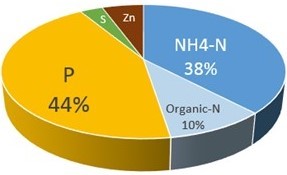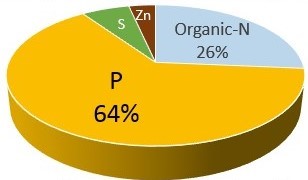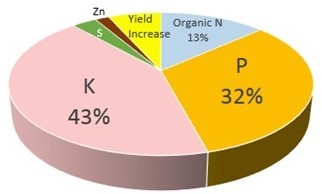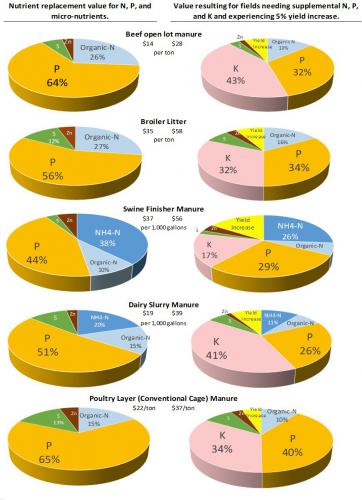What is the economic value of your manure?
Key principles and points that growers can use determine the economic value of manure.
Manure has been used for centuries as a soil amendment and a fertilizer source. The intangible values such as an increase in organic matter or an increase in water holding capacity is often discussed and acknowledged, but the real question that many farmers want to know, “How much money is my manure worth?” was addressed by Dr. Richard Koelsch from the University of Nebraska-Lincoln in a blog post on the Soil Health Nexus website. His research findings have led him to believe that there are 3 variables that define the economic value of manure.
- Phosphorus (P) value (Figures 1 and 2)
- Potassium (K) value
- Yield Response (Figure 3)

Figure 1: The nutrient replacement value of beef open lot manure is approximately $14/ton* when surface applied. *This assumes supplemental K is not needed and no yield increase results. Additional assumptions found at the end of this article. Courtesy of Dr. Richard Koelsch

Figure 2: The nutrient replacement value of swine finisher manure is approximately $37/1,000 gallons* when injected. *This assumes supplemental K is not needed and no yield increase results. Additional assumptions found at the end of this article. Courtesy of Dr. Richard Koelsch

Figure 3: Value of beef open lot manure assuming crop benefits from potassium supplementation and 5 percent increase in yield. Estimated manure value is $28/ton. Courtesy of Dr. Richard Koelsch
Dr. Koelsch’s research has shown that to get the most economical value, farmers need to consider the rate of their manure application. He advises growers to follow these basic manure practices:
- Manure should be applied at a rate that does not exceed the crop Nitrogen (N) requirements for a single year. Excess manure N application is likely to leach beyond the root zone and be lost.
- Manure applied at rates near the crop’s N requirement typically over applies P and K. However, these nutrients will continue to be available to crops in future years. To gain the manure’s P and K value, target those fields requiring supplemental P and K. In addition, avoid re-applying manure to the same field until soil testing suggests the need for supplemental P and K.
Accessing the economic value of manure begins by targeting fields low in P and K. Similar benefits are observed for other manures as illustrated in Figure 4. To view the full article visit the Soil Nexus Website blog post.

Figure 4: Low and high economic value estimate of different animal manures based upon nutrient replacement value for manure N, P and micro-nutrients (column1) and additional value assuming benefit from manure K and crop yield increase of 5 percent (column 2).
[i] Assumptions for graphs: Price of nutrients were assumed to be $0.35/lb. N, $0.40/lb. P2O5, $0.35/lb. K2O, $0.35/lb. sulfur, $2.90/lb. zinc. For some figures a yield increase of 5 percent was assumed and allocated to a manure application rate designed to meet 75 percent of N requirement of a 200 bushel/acre corn crop (e.g. 19 ton of feedlot manure/acre). Corn was valued at $3.50/bushel.



 Print
Print Email
Email

